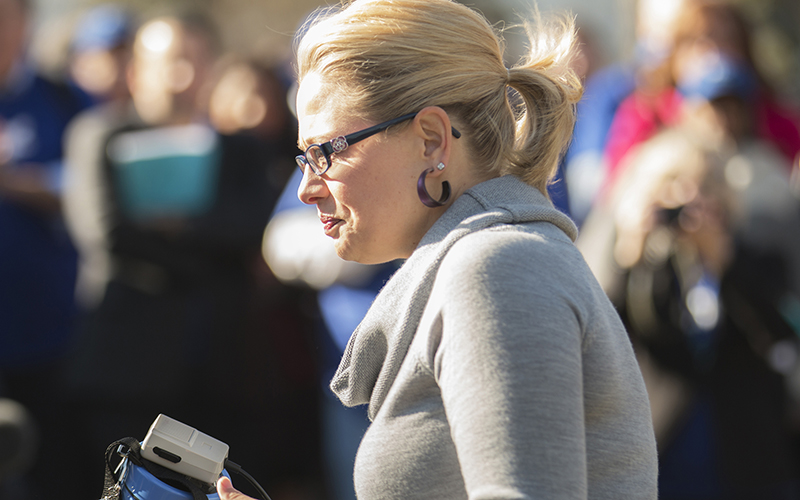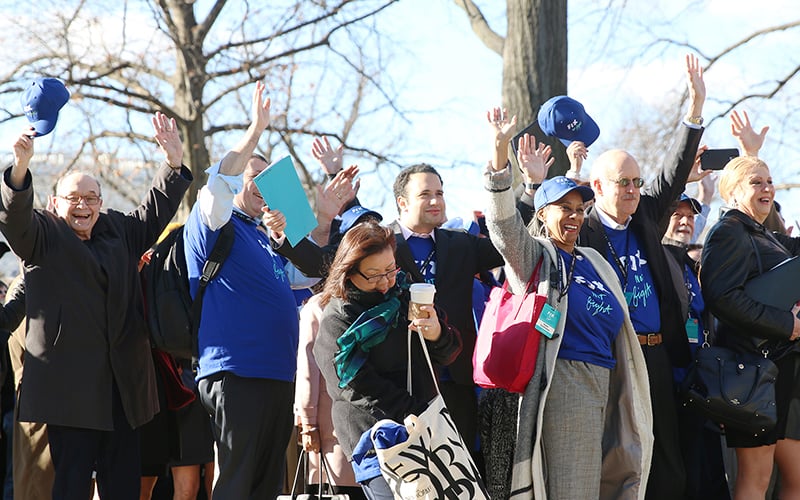
Rep. Kyrsten Sinema, D-Phoenix, at the rally calling for bipartisan compromise in Washington. She said voters are tired of “ugliness and division” and want “practical solutions.” (Photo by Andres Guerra Luz/Cronkite News)

Voters at the “Fix Not Fight” rally organized by the bipartisan group No Labels outside the Capitol before heading out to call on lawmakers and urge them to cooperate across party lines. (Photo by Andres Guerra Luz/Cronkite News)
WASHINGTON – Rep. Kyrsten Sinema, D-Phoenix, and Brookings Institution scholar Thomas Mann agree on one thing: Washington is stuck in partisan gridlock. But when it comes to the likelihood of a solution, the two are as divided as Congress itself.
Mann said a bipartisan group of lawmakers and advocates who rallied for bipartisan compromise Thursday at the Capitol were engaged in wishful thinking, saying that a majority of Americans are not in the middle on most issues.
“Pretending there’s a vast majority of centrists has been proven to be largely nonsense,” said Mann, adding that party has become so much of voters’ identity that it becomes “dangerous” in today’s political climate for politicians to vote against their party.
That didn’t stop Sinema and the others at the No Labels coalition’s National Problem Solvers Conference from calling for more compromise in Congress, and urging voters to lean on their elected officials to do just that.
“I think it’s evident that we are in a time of ugliness and division, and Americans don’t want that,” Sinema said after her speaking at the rally. “They want practical solutions.”
She and others expressed optimism that the American people can combat what she called an “unprecedented level of hyperpartisanship” in Washington.
The rally included about a dozen lawmakers, Republican and Democratic, and hundreds of voters who later fanned out across Capitol Hill to call on members of Congress.
There was a general sense during the event that a “silent majority” of Americans want to see Congress meet in the middle on issues, and that the challenge for groups like No Labels is to move that majority to action and to overcome the loud voices from the far right and far left.
David Westerby came from Utah for the conference that he said drew more than 1,000 people to Washington for the two-day event.
-Cronkite News video by Marisela Ramirez
“We are here to encourage our congressmen to quit listening to the extreme voices from the left and the right and join together with the majority of American people in the middle,” Westerby said.
New Hampshire resident Gretchen Ziegler said that even if members of Congress don’t cooperate on legislation, or refuse to hold town halls with their constituents, voters in the middle can still promote bipartisanship by turning out to vote in the primaries.
“If we can get the broad-based middle to turn out for the primaries, we can make a real difference,” Ziegler said.
But even if there is a majority centrist population in the U.S., it would still be difficult to convince their representatives to compromise, said Norman Ornstein of the American Enterprise Institute.
Ornstein and Mann co-authored “It’s Even Worse Than It Looks,” a 2012 book about the partisan deadlock that is deeply rooted in Congress. Ornstein said working across party lines is “very rare” and it will be even harder to do under the administration of President Donald Trump whose campaign made the country even more polarized.
Ornstein, a longtime observer of Congress, said its members tend to reach bipartisan compromise under only two instances. One is when the party resistant to compromise starts to think it will suffer significantly if it doesn’t cooperate with the other side. The other is when the issues at hand are so noncontroversial that working with the other party won’t bring public criticism, he said.
Mann said the parties now are “tribalistic” and that “there’s increasingly very little overlap” between them.
“Partisanship is the most powerful force in our politics right now,” he said.
Rep. Raul Grijalva, D-Tucson, said Thursday that he appreciates what Sinema and the other lawmakers hope to do by bridging the gap between Republican and Democrat lawmakers. But Grijalva, rushing to a vote, said he holds little hope for compromise while Republicans control both chambers of Congress.
“Sitting in the extreme middle is not going to solve our problems,” Grijalva said.
Sinema told voters at the rally that it is up to them to push their elected officials to put Americans before partisan politics.
“More than ever we need more problem solvers in Congress,” Sinema said outside the rally. “We need more people who are willing to roll up their sleeves and get work done and to let go of the partisan trappings that you see taking over Washington.”